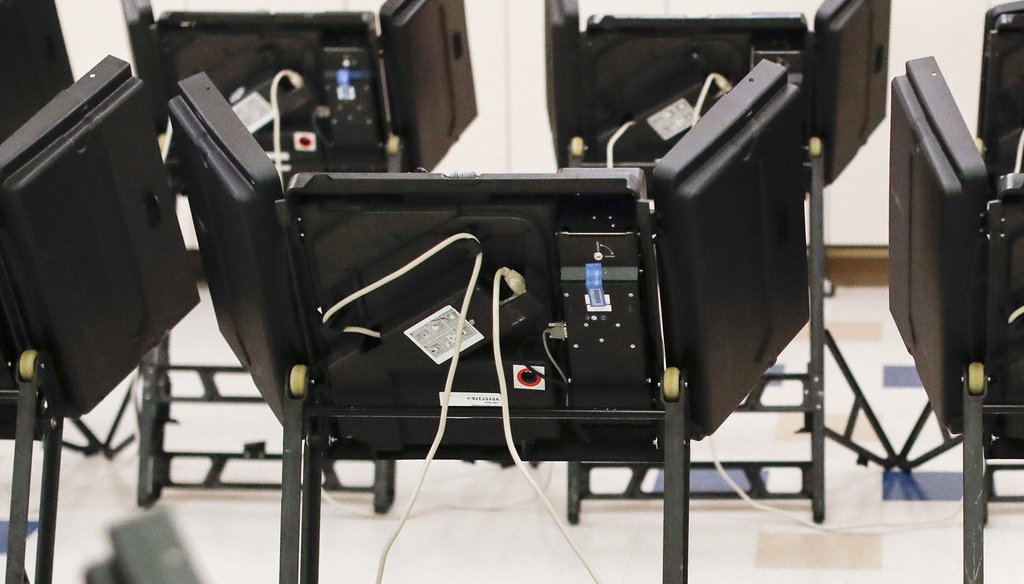Get PolitiFact in your inbox.

This Tuesday, Aug. 7, 2018 file photo shows electronic voting machines in a polling station in Dublin, Ohio. (AP Photo/John Minchillo)
Voter fraud claim in Ohio special election lacks evidence
A website raised the specter of voter fraud in a hotly contested Ohio special election by saying dozens of people older than 116 are registered to vote in the district.
"Red Alert: Major Signs of Voter Fraud Uncovered In Ohio," read the headline of the American Journal Review.
But the facts are less sinister than the headline makes it sound.
Here’s what you need to know.
The post borrows heavily from an article posted on Breitbart by Eric Eggers, research director at the Government Accountability Institute, a conservative nonprofit. Eggers wrote a story, which begins: "Republican Troy Balderson clings to a narrow margin in last night’s special election for Ohio’s 12th Congressional district, underscoring the impact voter fraud can have in key elections around the country," Eggers wrote.
Eggers raised the prospect that people were impersonating dead voters, claiming that "72 voters over the age of 116 who ‘live’ in Balderson’s district cast ballots in the 2016 election."
The Breitbart article links to a list of voter IDs of Ohioans whose birthdates are listed in 1901 or earlier. Eggers sent us the same information when we reached out to him.
"Take into account the fact that there were 170 voters in the state of Ohio that were listed as older than 116," American Journal Review wrote. "These names still sat in Ohio’s 12th Congressional district’s rolls when the data was collected by GAI in August of 2017.
"This is equivalent to 10 percent of the margin that Balderson is currently leading by, without provisional ballots. More than 72 percent of Ohio voters over 116 years old who are "living" in the district Balderson is running in voted in the 2016 election…"
Considering the fact that the world’s oldest living person is 115 years old, and that the vote counts of the Democratic and Republican candidates were separated by roughly 1,700 votes the day after the election, we wanted to look into the allegation of the American Journal Review article that there were "major signs" of voter fraud.
(At the time of this story’s publication, it appears that Republican Troy Balderson leads Democrat Danny O’Connor by 1,564 votes, but some absentee and provisional ballots still need to be counted. The results will be sent to the Ohio Secretary of State on Aug. 24. Balderson and O’Connor will face off again in November.)
Indeed, there are 170 voters in the district listed with birthdays from 1901 or earlier. But the story builds a misleading impression by tying that fact to "voter fraud," where there is no evidence that dead people or people over 116 years old voted in the race.
The story overlooks a plausible explanation for turn-of-the-century birthdays of 170 registered voters: Ohio didn’t require citizens to provide their dates of birth when registering to vote until 1974.
Jan. 1 holds the spot
The list of Ohio voters shows 170 voter IDs and corresponding dates of birth, all of which are listed as being in 1901 or earlier.
But if you look closely, you’ll notice that almost all of the voters’ dates of birth are listed as one of three dates: Jan. 1, 1800, Jan. 1, 1900, or Jan. 1, 1901.
The office of Ohio Secretary of State Jon Husted responded to several misleading stories about the special election in a press release. "State law has not always required Ohioans to provide their date of birth when registering to vote," they wrote. "Prior to June 1974, when House Bill 662 was passed requiring date of birth to register to vote, county boards of election used placeholder dates. This is why some registrations have dates like 1900 or 1800 listed."
Husted doubled down in a tweet: "No one 116 or older is voting in Ohio elections. Voters who registered when DOB wasn't required have a placeholder date as their DOB. Often the year 1900 was used."
Enough misinformation: Time for the facts. No one 116 or older is voting in Ohio elections. Voters who registered when DOB wasn't required have a place holder date as their DOB. Often the year 1900 was used. https://t.co/RMMuIh29tf
— Jon Husted (@JonHusted) August 13, 2018
Outside elections experts said Husted’s explanation was valid.
"Husted’s explanation is entirely credible and unremarkable," said Justin Levitt, a professor at Loyola Law School.
The practice isn’t unique to Ohio. Other states have used placeholder dates of birth.
In New Jersey in 2005, the birthdates of seven voters were listed as Jan. 1, 1880. A Brennan Center for Justice report concluded that the date "is most likely a system default for registrations lacking date-of-birth information."
The fact that only 170 out of 8 million registered voters (0.002 percent of voters) in Ohio had incorrect birthdates is "pretty good," Levitt said.
Our colleagues at Factcheck.org, debunking a similar article, actually spoke with some Ohio voters listed as 116 or older.
"Although we couldn’t talk to everyone registered in the 12th District who was listed as being born in 1800 or 1900, we did talk to some of them and can confirm that they are living, breathing, eligible voters," Factcheck.org wrote. "Charles Hacker, of Mansfield, Ohio, is one of them. He registered to vote in 1973, according to the voter roll, and his birthdate is listed as Jan. 1, 1800. But he was actually born in 1944, he told FactCheck.org in a phone interview. He’s 74 years old."
Our ruling
An article from the American Journal Review claimed, "Red Alert: Major Signs of Voter Fraud Uncovered In Ohio," and went on to say that "170 voters in the state of Ohio that were listed as older than 116."
The reality isn’t as fishy as the headline sounds.
The story manipulates an oddity about Ohio’s voter database into a misleading narrative about voter fraud. While there are 170 voters listed as over 116 years old, that is almost definitely not their real birthdays.
That’s because those voters likely registered to vote in Ohio before 1974, when they weren’t required to provide their date of birth. Because the voting record lacked these voters’ dates of birth, placeholder dates from 1800 and 1900 were used, the state’s Republican secretary of state said.
The statement contains an element of truth but ignores critical facts that would give a different impression. We rate it Mostly False.
Correction Aug. 22, 2018: After we published this item, we heard from Eggers that his point wasn't accurately covered in this fact-check. As a result, we added additional information from Eggers and clarified the point of this fact-check, which was a suggestion made by some bloggers that Ohio's voter rolls were a sign of voter fraud.
Our Sources
Breitbart, "Expert: 170 Registered Voters in Ohio’s 12th District Listed as Over 116 Years Old," August 8, 2018
Email exchange with Eric Eggers, research director, Government Accountability Institute, August 13, 2018
The Ohio Legislature, House Bill 662, 1974
Email exchange and phone interview with Sam Rossi, press secretary, Ohio Secretary of State Jon Husted, August 13-14, 2018
Phone interview with Jonathan Brater, counsel for the Democracy Program, Brennan Center for Justice, August 14, 2018
Phone interview with Jason Snead, policy analyst, The Heritage Foundation, August 14, 2018
Phone interview with Justin Levitt, professor of law, Loyola Law School, August 15, 2018
Ohio Secretary of State Jon Husted, Press Release, "Secretary Husted Addresses Misinformation & Misleading Claims Regarding Recent Special Election," August 13, 2018
Ohio Secretary of State Jon Husted, Press Release, "Husted: Investigation Uncovers Non-Citizens Who Registered to Vote & Illegally Cast Ballots," February 27, 2017
The Brennan Center for Justice, "The Truth About Voter Fraud," written by Justin Levitt, 2007
Tweet, Jon Husted, August 13, 2018
Factcheck.org, "Bogus Claim of Voter Fraud in Ohio," August 15, 2018
Government Accountability Institute, "About," accessed August 20, 2018
The Heritage Foundation, "Election Fraud Cases From Across the United States," accessed August 20, 2018
American Journal Review, "Red Alert: Major Signs of Voter Fraud Uncovered In Ohio," accessed Aug. 20, 2018
Browse the Truth-O-Meter
More by Lucia Geng
Voter fraud claim in Ohio special election lacks evidence
Support independent fact-checking.
Become a member!
In a world of wild talk and fake news, help us stand up for the facts.















































